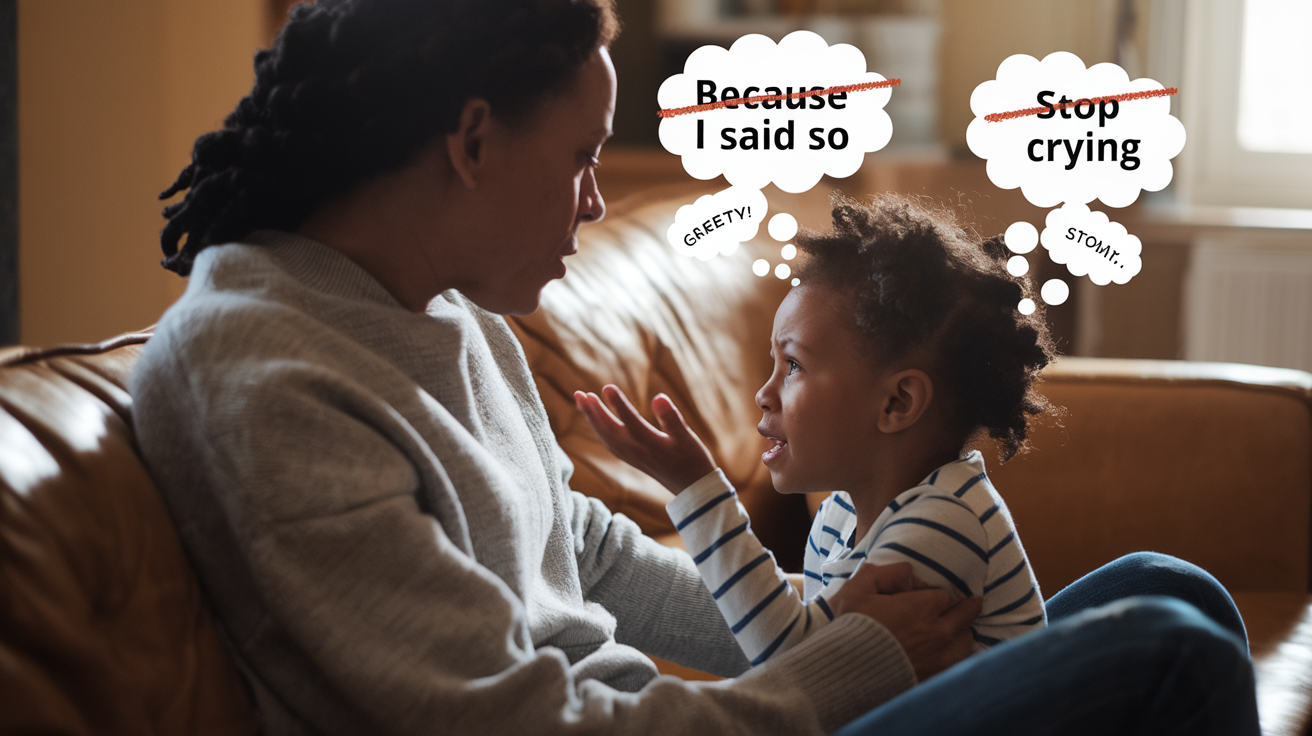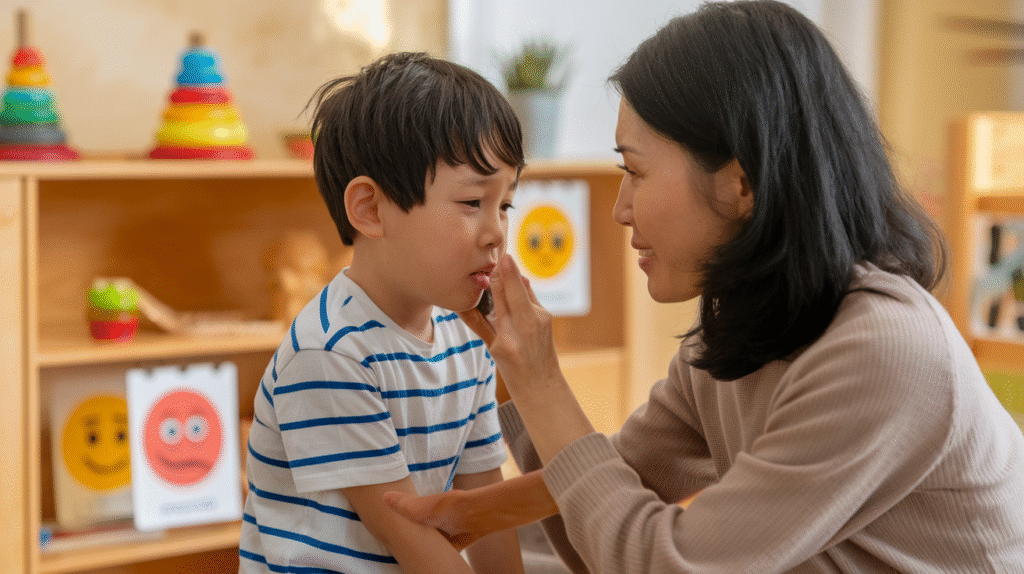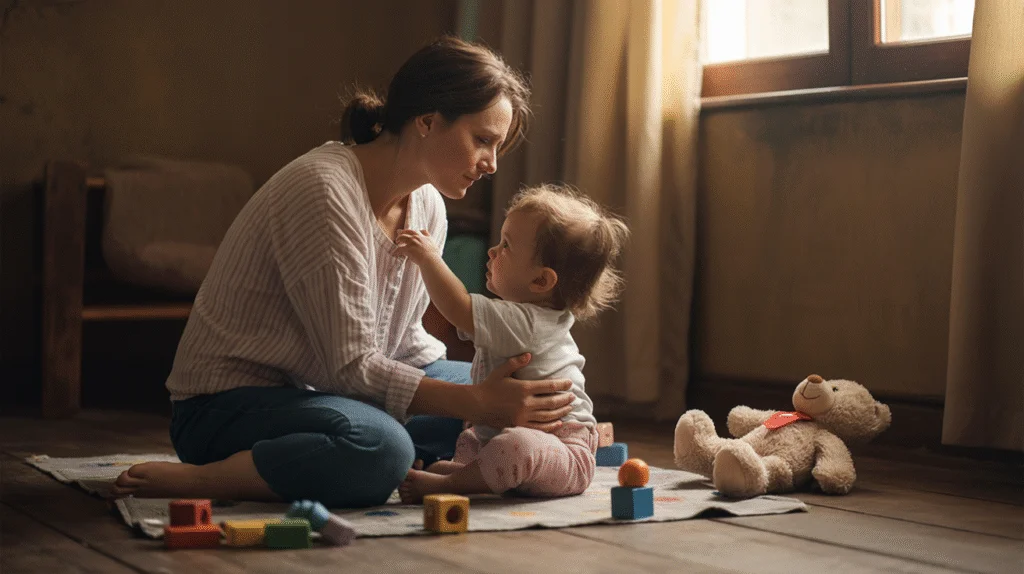Things I Stopped Saying to My Child (And Why)

Ever hear yourself saying something to your child and think “Oh God, I sound exactly like my mother”? It happens to all of us – those automatic phrases we swore we’d never use somehow finding their way into our daily parenting vocabulary.
I spent years dropping verbal bombs on my kids without realizing the damage. “Because I said so” and “Stop crying or I’ll give you something to cry about” became my go-to phrases when overwhelmed.
Positive parenting language isn’t just feel-good fluff. It’s about building children who feel secure enough to develop emotional intelligence rather than compliance through fear.
The words we choose literally shape our children’s brains. But here’s what nobody tells you about changing your parenting language…
Phrases That Diminish Confidence

A. “Be careful” and better alternatives
Ever catch yourself saying “be careful” a hundred times a day? I sure did. But here’s the thing – those two little words don’t actually teach our kids anything. They just plant seeds of doubt.
When I say “be careful” to my daughter climbing the jungle gym, I’m really saying “I don’t trust you to handle this.” Not exactly confidence-boosting, right?
Try these instead:
- “Notice how slippery that rock is”
- “What’s your plan for getting down?”
- “I see you climbing high – how are you feeling up there?”
These alternatives actually give kids useful information and respect their abilities while still addressing safety. They learn to assess situations themselves rather than just hearing a vague warning.
B. “Let me do it for you” and its impact
I used to grab the zipper when my son struggled, thinking I was being helpful. Big mistake.
When we jump in too quickly, we secretly tell our kids, “I don’t think you can handle this.” Each time we take over, we steal a chance for them to build skills and confidence.
Instead, try:
- “This part is tricky. Want some tips or do you need more time?”
- “I notice you’re working hard on that. How can I help?”
- “You’ve got this, but I’m here if you need me”
C. Why “You’re too young to understand” limits growth
This phrase is an instant conversation-ender. And honestly? Kids understand way more than we give them credit for.
When we dismiss their curiosity with “you’re too young,” we’re not protecting them – we’re underestimating them. Children can grasp complex ideas when explained at their level.
Instead:
- “That’s a big question. Here’s what I can explain now…”
- “Let’s learn about this together”
- “What do you think about it?”
D. Replacing “Because I said so” with reasoned explanations
We’ve all been there – exhausted, out of patience, and boom: “Because I said so!”
But this phrase teaches nothing except that power trumps reason. It shuts down thinking and creates power struggles.
Try these approaches:
- Give brief, honest reasons: “We need to leave because the store is closing”
- Acknowledge feelings: “I know you want to stay longer. It’s hard to stop having fun.”
- Offer choices within limits: “We have to go, but would you like to walk or skip to the car?”
Language That Creates Unhealthy Comparisons

“Why can’t you be more like…” and its damage
I caught myself saying it before I could stop: “Why can’t you be more like your sister?” The moment those words left my mouth, I saw my son’s shoulders slump.
Comparing our kids to others is toxic. Full stop.
When we say things like “Look how nicely Jayden sits at the table” or “Emma always finishes her homework without being asked,” we’re not motivating our children. We’re telling them they’re not good enough as they are.
These comparisons create competition where there shouldn’t be any. Your child starts seeing their siblings, cousins, or classmates as rivals rather than potential allies or friends.
Worse, it damages their self-worth. Kids internalize these comparisons as “I’m not as good as them” or “Mom/Dad wishes I was different.”
Instead, try:
- “I noticed you really focused on your LEGO building today.”
- “What do you think would help you remember to put your shoes away?”
- “Let’s figure this out together.”
How “When I was your age…” creates unrealistic standards
“When I was your age, I walked five miles to school uphill both ways…”
Sound familiar? We joke about it, but many of us still use this phrase with our kids.
The problem? Our childhoods happened in a completely different world.
When we were kids, there wasn’t social media pressure. School shootings weren’t monthly occurrences. Climate change wasn’t a looming threat our children feel powerless against.
The “when I was your age” comparison creates an impossible standard. It ignores how dramatically childhood has changed and dismisses the unique challenges our kids face today.
It also romanticizes our own childhoods, which definitely weren’t perfect either.
Instead of looking backward, try:
- “Things are really different now than when I grew up. What’s hard about being a kid today?”
- “I see you’re struggling with this. How can I help?”
- “Tell me more about what that’s like for you.”
Moving away from achievement-based praise
“You’re so smart!” “You’re the best player on the team!”
These compliments seem harmless, right? Actually, they create pressure for kids to maintain their “smart” or “best” status.
Achievement-based praise makes kids believe their worth comes from their accomplishments, not their character. They learn to fear failure because it might change how you see them.
Research shows kids praised for effort rather than intelligence are more likely to tackle difficult challenges and bounce back from setbacks.
Consider the difference:
- “You’re so smart!” → “I noticed how hard you worked on that math problem.”
- “You’re the best artist!” → “I love how you mixed those colors together.”
- “You won!” → “You kept trying even when it got tough.”
This shift helps your child develop a growth mindset where challenges become opportunities to improve, not threats to their identity.
Words That Limit Emotional Development

A. “Stop crying” and why emotions need validation
I used to say “stop crying” whenever my kid had a meltdown in public. Deep down, I just wanted the noise to end. But here’s the thing – telling kids to stop crying is like telling them their feelings don’t matter.
Kids need to know their emotions are valid. When we shut down tears, we’re basically saying, “Your sadness isn’t welcome here.” Ouch.
Research in child emotional development shows that kids who are allowed to express feelings actually develop better emotional regulation. Weird, right? By letting them feel, they learn to manage those feelings on their own.
B. Alternatives to “You’re fine” when they’re clearly not
“You’re fine” became my automatic response to every bump and bruise. But when my daughter looked at me with tears streaming down her face, she definitely wasn’t fine.
Try these instead:
- “That looked like it hurt. Need a hug?”
- “I see you’re upset. I’m here.”
- “Tell me what happened.”
These phrases acknowledge their experience rather than dismissing it. The magic of positive parenting phrases is that they build trust – your child learns you’ll take their feelings seriously.
C. Why “Boys/Girls don’t…” reinforces harmful stereotypes
“Boys don’t cry” and “Girls don’t get angry” were phrases I heard growing up, and shamefully, I caught myself repeating them.
These statements create invisible cages around our kids. They teach boys to bottle emotions and girls to suppress certain feelings altogether.
When we drop these phrases, we give our kids permission to be fully human. My son can be sensitive. My daughter can be fierce. And that’s perfectly okay.
D. “Don’t be so sensitive” and its long-term effects
Calling a child “too sensitive” might seem harmless, but it can create lasting damage.
A child hearing this message repeatedly learns their natural emotional responses are wrong. Over time, they either amplify those feelings (to be heard) or suppress them entirely (to avoid criticism).
Studies in parenting psychology reveal that highly sensitive children often have incredible empathy, creativity, and perception. By honoring sensitivity instead of shaming it, we’re actually nurturing powerful gifts.
E. Better responses to emotional moments
Instead of shutting down emotions, try these approaches:
- Name the feeling: “You seem frustrated right now”
- Validate: “It makes sense you feel disappointed”
- Offer support: “Would you like space or a hug?”
- Problem-solve together: “When you’re ready, let’s figure this out”
These supportive language techniques don’t just build child confidence – they create emotional intelligence. By changing how we respond to big feelings, we’re teaching skills they’ll use for life.
The hardest parenting shift I’ve made is becoming comfortable with my child’s discomfort. But it’s been worth every challenging moment.
Phrases That Undermine Autonomy

A. Moving beyond “Hurry up” to respectful time management
Ever notice how often “Hurry up!” slips out of your mouth? I sure did. This phrase creates anxiety and sends the message that their pace isn’t acceptable. Kids operate on a different timeline than adults—they’re exploring, learning, and processing.
Instead of rushing them, I’ve switched to time-awareness language:
- “We have five minutes before we need to leave”
- “When the big hand reaches 12, we’ll start our shoes-on routine”
- “Do you think you can finish getting dressed before this song ends?”
This shift gives them information rather than criticism, and turns transitions into opportunities rather than battlegrounds.
B. Why I stopped saying “You have to…”
“You have to eat your vegetables.” “You have to apologize.” Sound familiar?
These demands create instant resistance. Children, just like adults, want to feel they have choices.
I’ve replaced these statements with options that acknowledge reality while preserving dignity:
- “It’s vegetable time. Would you like carrots or broccoli?”
- “How could we make this right with your friend?”
This small language shift dramatically reduces power struggles while teaching kids how to make good choices on their own terms.
C. Replacing commands with collaborative language
“Put on your coat!” “Clean up your toys right now!”
Commands position you as the boss and your child as the subordinate. This dynamic breeds resentment and compliance without understanding.
Try collaborative phrasing instead:
- “It’s cold outside. What do you need to stay warm?”
- “Let’s get these toys put away so we have room to play tomorrow”
Collaboration honors your child as a thinking person capable of understanding reasons behind requests.
D. Honoring their bodily autonomy in social situations
I’ve stopped forcing my child to hug relatives or saying “Give Grandma a kiss!” This sends a dangerous message that they don’t control who touches their body.
Respecting bodily autonomy looks like:
- “Would you like to give a hug, high-five, or wave goodbye?”
- “You get to decide how you want to greet people”
- “It’s always okay to say no to a hug”
This approach teaches consent foundations from day one. When kids know their boundaries matter at home, they’re better equipped to maintain them elsewhere.
Future-Limiting Statements

The problem with “You always…” or “You never…”
Words like “always” and “never” might seem harmless, but they’re relationship poison. Think about how it feels when someone says, “You always forget to clean your room” or “You never listen to me.” Pretty awful, right?
These absolute statements do three harmful things:
- They’re factually untrue (nobody always or never does anything)
- They make kids feel defeated before they even try
- They focus on patterns instead of specific situations we can fix
When I caught myself saying “You never finish what you start” to my daughter, I saw her shoulders slump. In that moment, I realized I wasn’t describing her behavior—I was defining her identity in her mind.
Why labeling personality traits can become self-fulfilling
“You’re so shy.” “He’s our wild child.” “She’s the responsible one.”
Labels stick. When we repeatedly tell a child they’re “the messy one” or “not a math person,” they build their identity around these descriptions. It becomes their internal script.
Kids often think: “If this is who I am, why fight it?”
The research on this is clear—children internalize the labels we give them and then act accordingly. When I stopped calling my son “my picky eater” and instead said “you’re still discovering foods you enjoy,” his willingness to try new things actually increased.
How “That’s just how you are” prevents growth
“That’s just how you are” might be the most growth-limiting phrase in parenting.
It tells kids they’re fixed—unchangeable—instead of works in progress. It suggests their current struggles or challenges are permanent parts of who they are.
When my child struggled with math, saying “you’re just not a numbers person like your sister” would have given him permission to stop trying. Instead, saying “this is difficult for you right now, but your brain is growing with practice” opened up possibilities.
Children need to know they can change, improve, and evolve. Their identity isn’t set in stone at age 8 or 12 or 16.

The language we use shapes our children’s perception of themselves and the world around them. By removing phrases that diminish confidence, create unhealthy comparisons, limit emotional development, undermine autonomy, and place boundaries on their future, we create space for our children to grow into confident, emotionally intelligent individuals who believe in their capabilities.
Shifting our communication patterns takes practice and patience. Start by observing your own speech patterns and making small changes where needed. Remember that perfection isn’t the goal—progress is. As you mindfully adjust your language, you’ll foster a relationship built on respect and encouragement that empowers your child to thrive on their unique journey.




